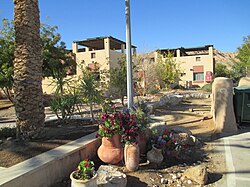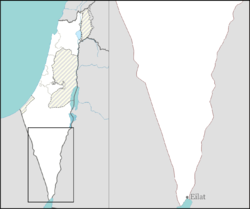Ketura (Kibbutz)
|
Ketura קְטוּרָה |
|
|---|---|
 |
|
| Coordinates: 29°58′3.36″N 35°4′15.24″E / 29.9676000°N 35.0709000°ECoordinates: 29°58′3.36″N 35°4′15.24″E / 29.9676000°N 35.0709000°E | |
| District | Southern |
| Council | Hevel Eilot |
| Affiliation | Kibbutz Movement |
| Founded | November 1973 |
| Founded by | American immigrants |
| Population (2015) | 485 |
| Website | www.ketura.org.il |
Ketura (Hebrew: קְטוּרָה) is a kibbutz in southern Israel. Located north of Eilat in the Arabah valley, it falls under the jurisdiction of Hevel Eilot Regional Council. In 2015 it had a population of 485.
Ketura was founded in November 1973 by a group of young Americans, most of them members of the Zionist youth movement Young Judaea. Its name was taken from a nearby hill and wadi, and is also the name of the second wife of Abraham (Genesis 25:1). Difficulties in the early years frustrated many of the inhabitants of the kibbutz, which caused many of the founders to leave. At the same time, more Young Judaeans joined the community, along with a variety of other immigrants as well as Israel Boy and Girl Scouts Federation graduates. Ketura is in the Southern Arava - Hevel Eilot Regional Council.
Today Ketura has about 150 members and several young families who are candidates to become members. During the year there are about 450 people living on Ketura, members and their families, students in the Arava Institute, volunteers from around the world, AICAT students from around the world, NOAM youth Movement members in various programs such as gap year or shnat sherut, and researchers who come to work in regional institutes.
Ketura is unique among kibbutzim for its religious pluralism. Although the kibbutz is not considered a religious kibbutz, Kashrut and Shabbat are observed in the dining room, public areas, and at social and cultural events, and there is a functioning congregation-led egalitarian synagogue. The population of the kibbutz is composed of observant, masorati, and secular members, an unusual situation for a kibbutz. Ketura received the Speaker of the Knesset Prize for religious tolerance as a result of its religious progressiveness.
...
Wikipedia

